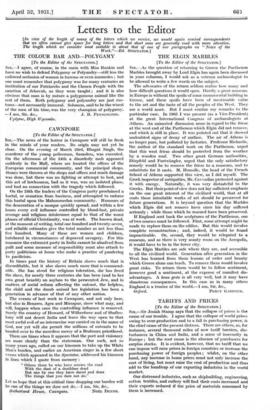THE ELGIN MARBLES
[To the Editor of the SPECTATOR.] SIR,—As the question of returning to Greece the Parthenon Marbles brought away by Lord Elgin has again been discussed in your columns, I would ask as a veteran archaeologist to be allowed to write a few words on the subject.
The advocates of the return seldom realize how many and how difficult questions it would open. Hardly a great museum in Europe is without the spoils of some monumental building in Greece, and these spoils have been of inestimable value to the art and the taste of all the peoples of the West. They are a world asset. But I must confine my remarks to the particular case. In 1905 I was present (as a Vice-President) at the great International Congress of archaeologists at Athens. An animated discussion arose in regard to the frieze at the west end of the Parthenon- which Elgin did not remove, and which is still in place. It was pointed out that it showed undoubted signs of decay of surface. The air of Athens is no longer pure, but polluted by factories. Professor Michaelis, the author of the standard work on the Parthenon, urged that this west frieze should be protected from the weather by a wooden roof. Two other great German authorities, Dorpfeld and Furtwangler, urged that the only satisfactory remedy would be to remove the frieze to a museum, and to substitute for it casts. M. Homolle, the head of the French School of Athens supported this view, as I did myself. The Greek inspector of antiquities, Mr. Cavvadias protested against it with energy. Naturally, it was very distasteful to the Greeks. But their point of view does not lay sufficient emphasis on the one great interest of the civilized world, that at all costs these inimitable works of art should be preserved for future generations. It is beyond question that the Marbles which Elgin did not remove have since his day suffered seriously ; while those which he rescued have been preserved.
If England sent back the sculptures of the Parthenon, one of two courses must be followed. First, some attempt might be made to replace them on the edifice. But this would involve complete reconstruction ; and, indeed, it would be found impracticable. Or, second, they would be relegated to a museum, and as there" is very scanty room on the Acropolis, it would have to be in the lower city.
The Elgin Marbles are safe where they are, and accessible to all the civilized world. Generation after generation in the West has learned from them lessons of order and beauty which Greece alone can teach. To remove them would involve great risks. To return them would be to follow sentiment, however good a sentiment, at the expense of manifest dis- advantages. A beau geste is all very well, but it may have disastrous consequences. In this case as in many others England is a trustee of the world.—I am, Sir, &c.,






































 Previous page
Previous page